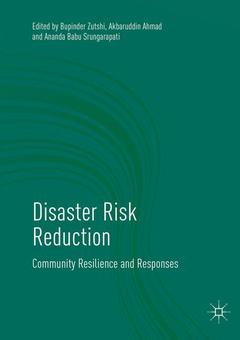Description
Disaster Risk Reduction, Softcover reprint of the original 1st ed. 2019
Community Resilience and Responses
Coordinators: Zutshi Bupinder, Ahmad Akbaruddin, Srungarapati Ananda Babu
Language: English
Subjects for Disaster Risk Reduction:
Publication date: 12-2018
Support: Print on demand
Publication date: 07-2018
Support: Print on demand
Description
/li>Contents
/li>Biography
/li>Comment
/li>
This book discusses the interconnected, complex and emerging risks in today?s societies and deliberates on the various aspects of disaster risk reduction strategies especially through community resilience and responses. It consists of selected papers presented at the World Congress on Disaster Management, which focused on community resilience and responses towards disaster risk reduction based on South Asian experiences, and closely examines the coordinated research activities involving all stakeholders, especially the communities at risk. Further, it narrates the experiences of disaster risk-reduction in different communities that have policy implications for mitigation of future disaster risks in the societies affected by these types of disasters. Written from the social science perspective to disasters rather than an engineering approach, the book helps development and governance institutions to prioritize disasters as a problem of development rather than being parallel to it.
Chapter 1: The struggles of women: An Experience from the flood prone area.- Chapter 2: Innovative use of Technology (GIS) forStructural Inequality and Disaster Risk Reduction: An Indian Experience Disaster Risk Reduction- a case study.- Chapter 3: Bridging the Gap Between Academicians & Bureaucrats- the NYSAF Way.- Chapter 4: Recovery after Disasters- Problems and Prospects: The Case of Koslanda -Meeriyabedda Landslide in Sri Lanka.- Chapter 5: Indigenous Knowledge and Practices in Disaster Management: Experie.- Chapter 6: Nces of the Coastal People of Bangladesh.- Chapter 7: Mainstreaming Nuclear Disaster Risk Reduction in India.- Chapter 8: Integrating disaster management content in to social work curriculum-voices of social work students.- Chapter 9: Coordination Does Matter for Effective Disaster Management in the Coastal Areas in Bangladesh.- Chapter 10: Cyclone Aila: Immediate Challenges and Impact on Socio-Economy.- Chapter 11: Post-traumatic Stress Disorder and Depression among the Survivors of Nepal Earthquake: A Need Assessment Study.- Chapter 12: Linking Gender vulnerability and Disasters.- Chapter 13: A Sociological Perspective on ‘Institutional Coordination’ for Disaster Risk Reduction in India.
Bupinder Zutshi, Professor, Centre for the Study of Regional Development, Jawaharlal Nehru University, New Delhi, India. Prof. Zutshi has more than 38 years of teaching and research experience at post-graduate and research level. He has published 7 books, completed more than dozen research projects and written several research articles in research journals of repute published from India and abroad. He has organized several national and international seminars and conferences. His major research interests are issues related to human settlements and their changing habitat, disaster risk and vulnerability of human settlements. Other research interests are issues related to demographic changes and their consequences on population composition and population characteristics, education and child labour issues, studies on tribal communities. He has completed several research projects sponsored by national and international organizations, which includes UN Women (UNIFEM), UNESCO (New Delhi), International Bureau of Education (IBE, Geneva), United Nations High Commissioner for Human Rights (Geneva), Ford Foundation (New Delhi), International Labour Organization (New Delhi), National Human Rights Commission of India, Election Commission of India and Indian Council for Social Science and Research.
Prof. Dr. Akbaruddin Ahmad is the Director and ProfessorBircham International University, Spain and Vice Chancellor, Darul Ihsan University, Bangladesh and Chairman of Bangladesh's leading civil society think tank, Policy Research Centre.bd.(PRC.bd). At present he is involved as the Chairman, Network of Asia Pacific Schools and Institute of Public Administration and Governance (NAPSIPAG) earlier headquartered at the Jawharlal Nehru University (JNU), New Delhi, now transferred to Colombo. He is also the Editor-in-Chief, Finance World Ltd. a weekly tabloid and Chairman, Royal Resort the only heritage resort in Bangladesh that manag




